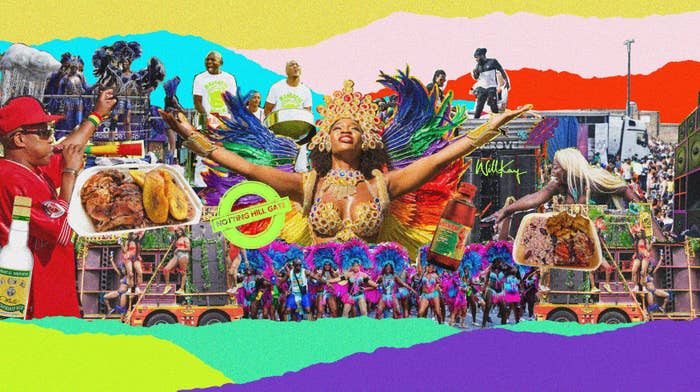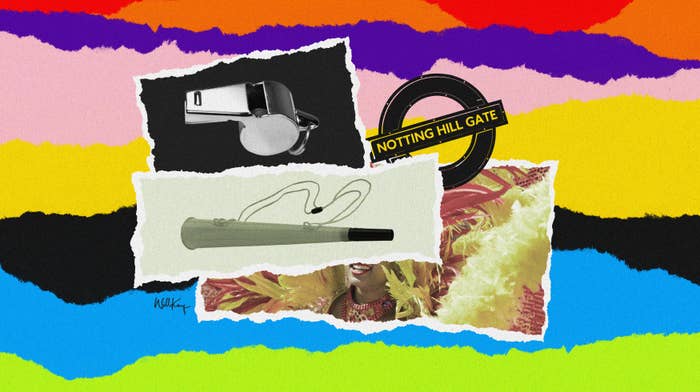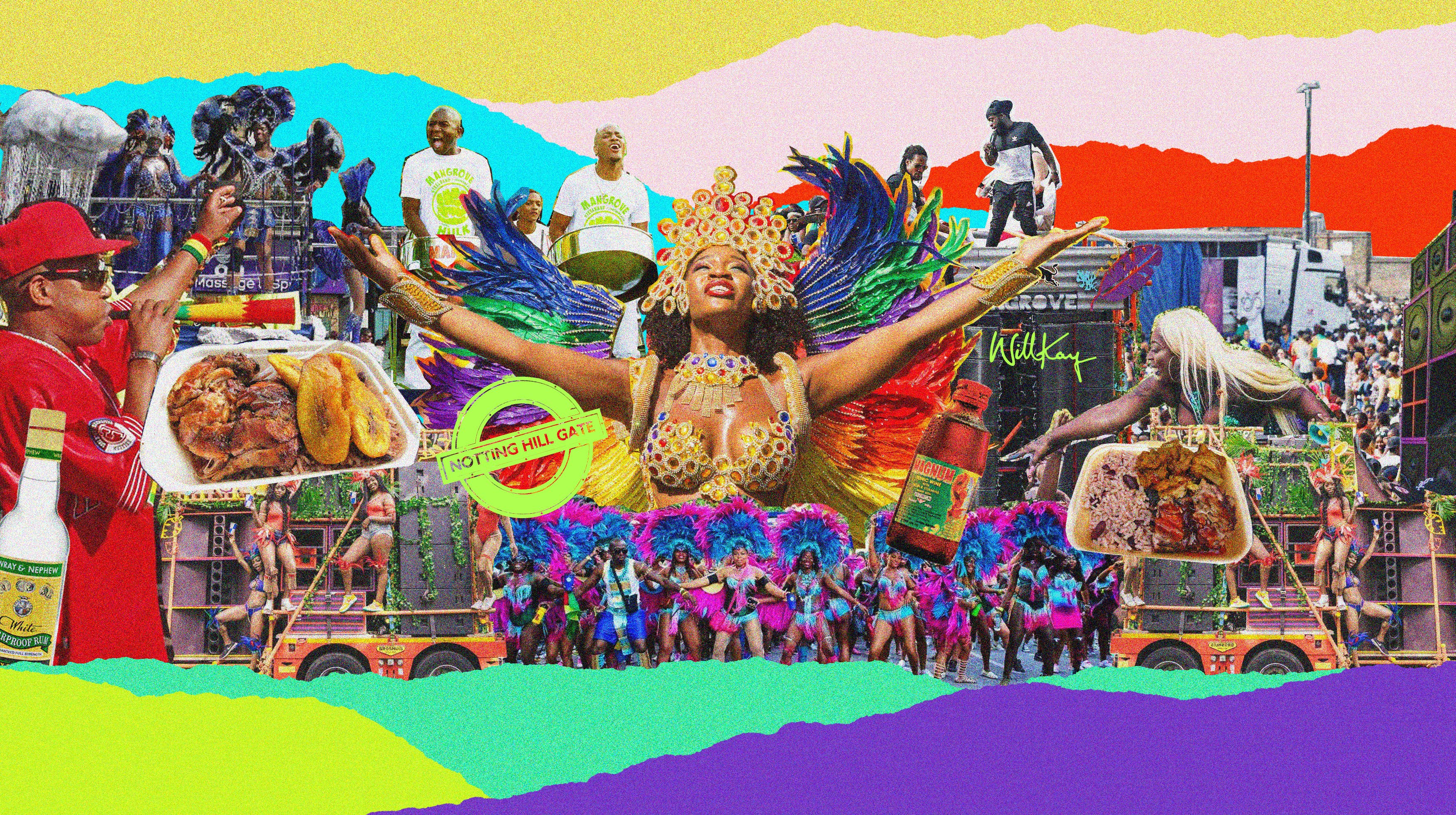
In 1948, three years after the Second World War, hundreds of people from the Caribbean migrated to Britain to help rebuild the country. Expecting a warm welcome—considering they were coming to help out—they were instead met with rampant overt and systemic racism.
West London’s Notting Hill became the landing place for many because they were able to find large ‘houses of multiple occupancy’. Despite the cramped and unsafe conditions of the houses and unscrupulous landlords, this was one of the few areas that allowed West Indian immigrants to rent. This put them in direct competition with white working-class residents for manual jobs which, unsurprisingly, led to tensions. Stocked by anti-immigrant rhetoric flamed by far-right groups such as Oswald Mosley’s Union Movement, the white working-class community grew resentful of the Caribbean community, which led to an unrelenting wave of abuse.
Britain in the 1950s was an ugly place, one where white youths would throw petrol bottles into the homes of West Indian families for simply being there. The ‘Teddy Boys’ were a white British subculture made up of rebellious young men who travelled from far and wide with the specific aim of terrorising Black communities in what they called “nigger hunting”. The police at the time were—of course—no help, and consistently ignored the cries of the community, leaving them to fend for themselves against groups of rabid racists. Much like today, in 1958, the existence of Britain’s racism was still questioned and seen as a debate to be had rather than a real experience to be dealt with, which did little to quell the racism. The Race Relations Act wasn’t introduced until 1965, which meant that West Indian people were not protected under law and could be discriminated against when it came to housing, access to shops and services.
The racial tensions reached breaking point in August of 1958, when the Teddy Boys violently struck Majbritt Morrison—a white Swedish woman—with an iron rod, calling her a “black man’s trollop” for dating a Jamaican man. The Teddy Boys slowly worked their way through Notting Hill, growing in number until 400 of them joined to wreak havoc on the Caribbean community. There was a subsequent riot that went on for five days, ending in 140 arrests and 108 charges. Spurred to raise the hopes of a dispirited generation of immigrants, Black activist and founder of the West Indian Gazette, Claudia Jones launched the first indoor Caribbean Carnival in St. Pancras in 1959. Inspired by Jones, Rhaune Laslett, activist and co-founder of the London Free School, started the Notting Hill Fayre that was initially a week-long celebration of the culture but eventually turned into the two-day extravaganza we know now as the Notting Hill Carnival.
But it hasn’t always been a smooth ride. The heavy police presence replacing what was once community volunteers, had exacerbated tensions between the police and the Black community. Carnival’s crime rhetoric is also amplified by the media who clamour after the festival to report the relatively small number of incidents and arrests as if large British festivals have—if not the same—higher rates of crime, and even deaths. Carnival is an inherently political space. It was borne out of struggle and continues to amplify those who are currently marginalised. “In 2017, because of the Grenfell Tower fire and to honour and respect what had happened, there was a suggestion to hold a one minute silence,” Kamala recounts. “On the soundsystem I was a part of, we extended it to five minutes. Carnival is a spiritual and uplifting experience; when we turned the music off, people were crying, and when we turned it back on there were tears of joy.”
Due to the global pandemic, for the first time in 54 years, Carnival has been taken off the streets and moved online in an attempt to keep the tradition going in a way that is safe and accessible. Given the disproportionate way that COVID-19 is affecting Black people, this is an essential and considered move.
The digital mainstage will be hosted by BBC Radio 1Xtra’s DJ Ace and Capital Xtra’s Remel London. The festival will take place across four channels, allowing you to still get the immersive Carnival experience from home. Carnival being online this year has allowed the team to rethink what it means to make this celebration of Blackness genuinely accessible. “Though it is not new to us to use technology in this way, we’ve all learned a lot from this process and there are elements that we will probably keep now,” Linett Kamala, Director of the Notting Hill Carnival board, explains to me over the phone. “For people who can’t physically get to Carnival, this has allowed us to share the Carnival experience with them.”

This year, Black Lives Matter merchandise will be sold and there will be online conversations about Carnival’s cultural history as part of the digital rollout, staying true to their political roots. Carnival is a thrilling and sensory experience; there is so much to consume and take in from the entire event that makes it so enjoyable. It all comes together as individuals prepare throughout the year to put on two days worth of pure colour and excitement.
Rianna Stevenson and Afiya Romain-Bains are the founders of Supernova Mas, a company that helps to curate the Carnival experience through incredible costumes to play mas with Karnival Mas. “Carnival has always been a big part of my culture,” says Romain-Bains. “I’ve been wearing costumes since I was a child, and we go as a family every year.” Stevenson has had a very similar relationship with Carnival, going with family when she was young and then with friends as she got older. “To me,” she says, “Carnival means unity and freedom, spending time with the people that I love and uniting with other like-minded individuals to be free and enjoy ourselves.”
Costumes are a huge part of what makes Carnival such a visual feast. Romain-Bain tells me that, in the 1700s, French Catholics came to Trinidad and held masquerade balls before they started fasting for lent. “The slaves held parties mimicking the slave owners by also wearing masks and weaving in elements of traditional West African attire, such as feathers,” she explains. “After the emancipation of slaves, carnival and costumes became a symbol for freedom and cultural identity. When Caribbean people came to this country, they brought the Carnival costume tradition with them.”
A crucial part of Carnival is commerce. It’s a chance to give directly to the Black community through buying anything from food to flags, and providing the opportunity for people to learn about the vast diversity of cultures within the Caribbean. Though inspired by the Trinidadian Carnival, Notting Hill sees all Caribbean groups come together to share and educate. Bokit’la is a Guadeloupean food stall based in Oval that has traded at Carnival every year since the business started. “I arrived in London when I was 17 years old,” founder Nico Baptiste tells me over the phone. “I’ve been here for 23 years and I haven’t missed a single Carnival. One of the reasons we participated in Carnival was to put our flag down and say hello to the world. Yes, there is Jamaica, Trinidad, Barbados and Grenada, but there is also Guadeloupe as well! The whole Carnival—the people, the music, the food—it’s just beautiful. For two days, people come together and there is peace and love everywhere.”
Khalia Ismain runs Jamii, a popular discount and discovery platform for Black-owned businesses. “At Carnival, we’ve got food businesses and flags that people can buy on the day, but we’ve also got the events companies, people who run floats and the costume designers,” she explains. “There’s a huge economic ecosystem around Notting Hill Carnival.” The move to put Carnival online has and will affect businesses, but we can still support these companies Ismain explains. “I know there are a lot of smaller events taking place, so if you’re going to go to one of those, you can still buy your outfits from where you were going to buy them from anyway. Even if you’re having your Carnival at home, you can still order from your local Caribbean takeaway.”
The nature of Carnival is bittersweet, as something so beautiful came out of something so violent and evil. As we celebrate Carnival online this year and on the road in future years, let’s remember the sacrifice and the true meaning behind this joyous celebration.

